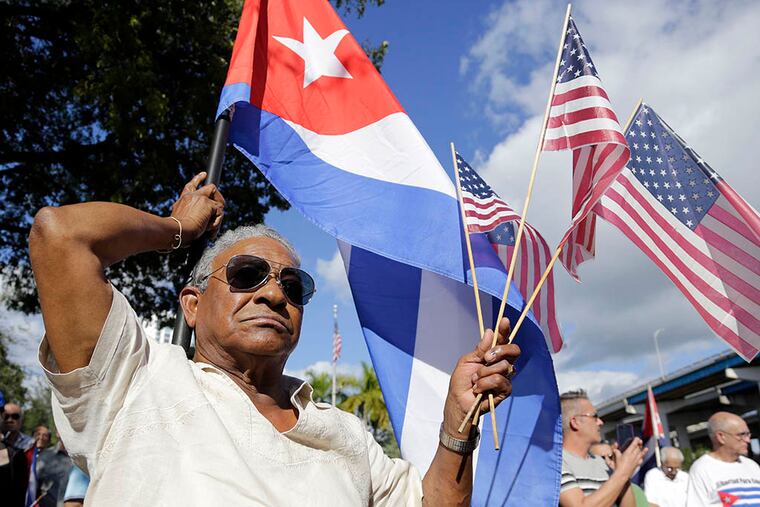PhillyDeals: Poll says Cuban Americans favor normalized relations
NEW YORK - A majority of Cuban Americans, whose opposition to the Communist regime in Cuba helped cement a 50-year U.S. trade embargo, now support normalizing trade relations between the two countries, according to a poll taken since President Obama's call for closer ties in December.

NEW YORK - A majority of Cuban Americans, whose opposition to the Communist regime in Cuba helped cement a 50-year U.S. trade embargo, now support normalizing trade relations between the two countries, according to a poll taken since President Obama's call for closer ties in December.
The survey of 400 Cuban Americans by pollsters Bendixen & Amandi International, Miami, done in mid-March after the community had had three months to debate the new policy, showed 51 percent approved of Obama's call to end the embargo and improve trade relations, and 40 percent against. The poll claims a margin of error of 4.9 percent.
By contrast, a December poll taken in the two days after Obama's announcement showed only 44 percent of Cuban Americans favoring better relations, with 48 percent against.
The March numbers show a "significant shift," Fernand Amandi, principal at the polling firm, said Wednesday, announcing the poll at the Wharton Cuba Opportunity conference in New York.
The poll found that Cuban Americans in Florida, a center of opposition to the Castro regime, still opposed closer relations, 49 percent to 41 percent. But Cuban Americans in other states back the new policy by a 3-1 ratio, 69 percent to 23 percent.
Younger Cuban Americans, recent arrivals, and community members born in the United States were more pro-engagement than older Cuban Americans and those born on the island.
"Industry, in general, favors lifting the embargo," and Cuban Americans in business are starting to agree, said Frank Del Rio, chief executive of Norwegian Cruise Line Holdings Ltd., who left his native Cuba at age 7 and has not been back.
"My wife is also Cuban-born. We have two children who have never been to Cuba. We have four grandchildren who we would like to see Cuba. It's just time."
He says Havana could rank with Nassau and Barcelona as a major cruise port within two years of better relations.
The Wharton conference, cochaired by sociologist Mauro Guillen, who runs Wharton's Lauder Institute, and Florida-based venture
capitalist Faquiry Diaz Cala assembled 250 investors, scholars, and others eager to encourage Cuban-American links.
Stefan Selig, undersecretary of commerce for international trade, said the embargo was a "failed policy" and said it was time for both countries to agree on major changes. He noted that European and Canadian investors have long been welcome to invest in Cuba, but said few had done so on a large scale. Cuba's transport and communications networks will need major upgrading first, he said.
Cubans can buy mobile-phone service but have to pay in advance, and current U.S. rules make it hard to transfer money between Cubans and U.S. companies, Luis G. Coello, chief executive of Miami-based CubaMobile Communications, said. He says he hopes U.S. banking restrictions will ease soon, helping develop a broader Cuban phone market.
Despite Obama's initiative, federal law still restricts U.S. investments in Cuba, and it is unclear if Congress will act soon.
The Cuban government of Raul Castro has allowed more private restaurants and family hotels, but has resisted foreign ownership and hiring, and is encouraging cooperative enterprises closer to the ruling socialist ideology.
Two of the hardest issues - the island's two currencies, for internal and trade use, and potential expropriation claims by U.S. firms and familes who fled the island - may need to be resolved before U.S. investment takes off, Guillen said.
215-854-5194 @PhillyJoeD